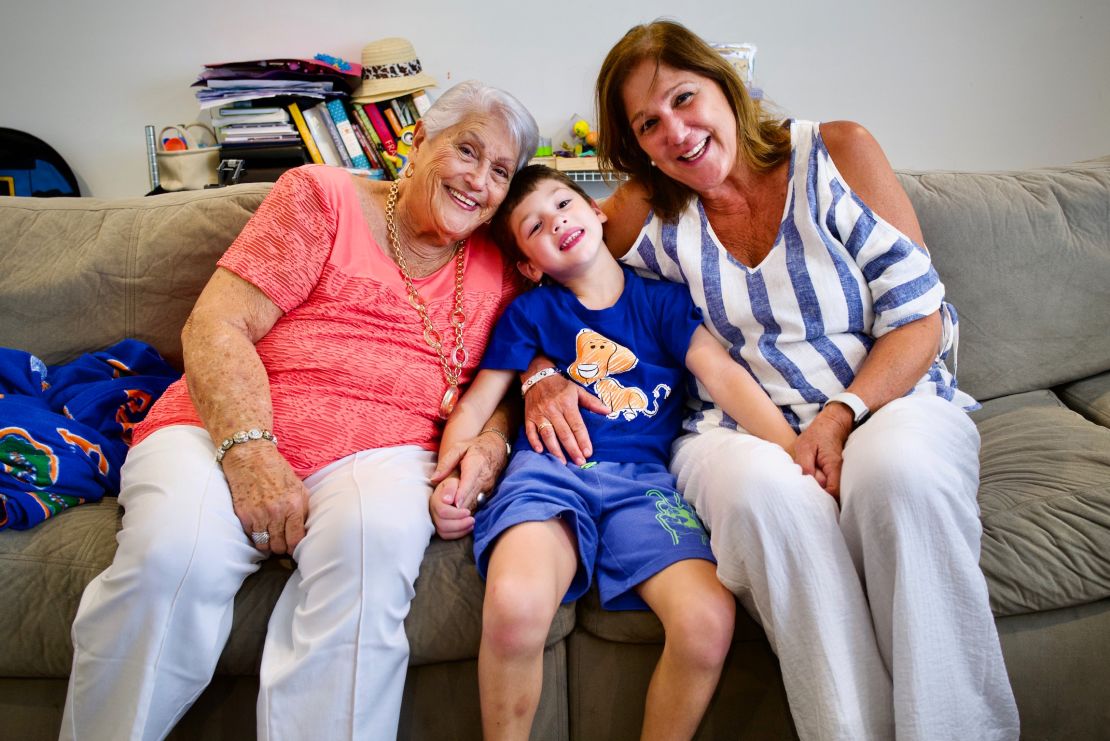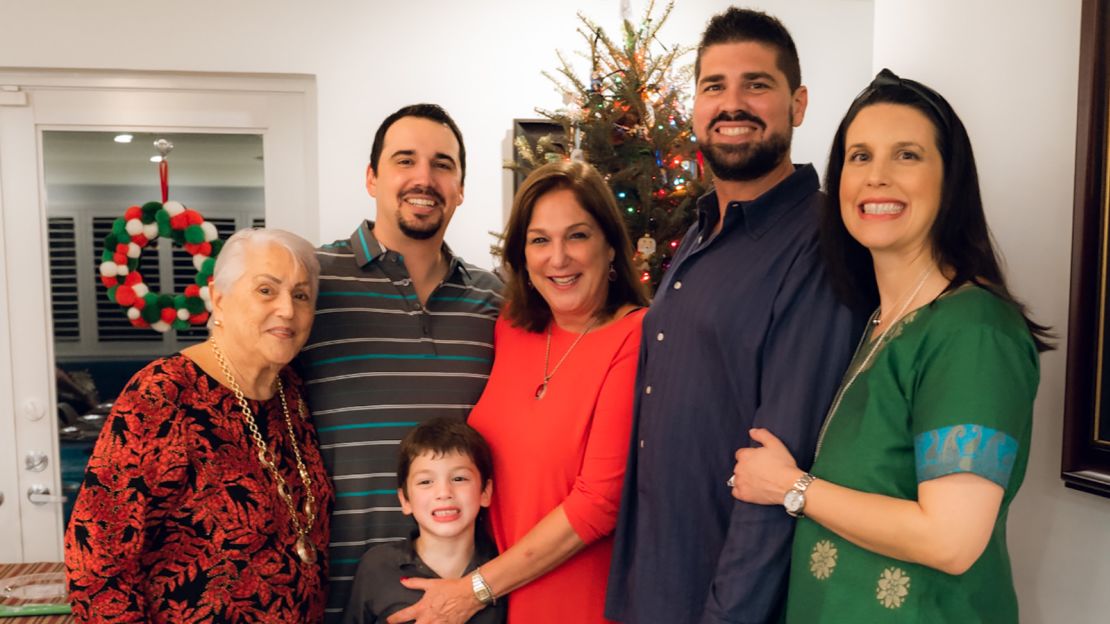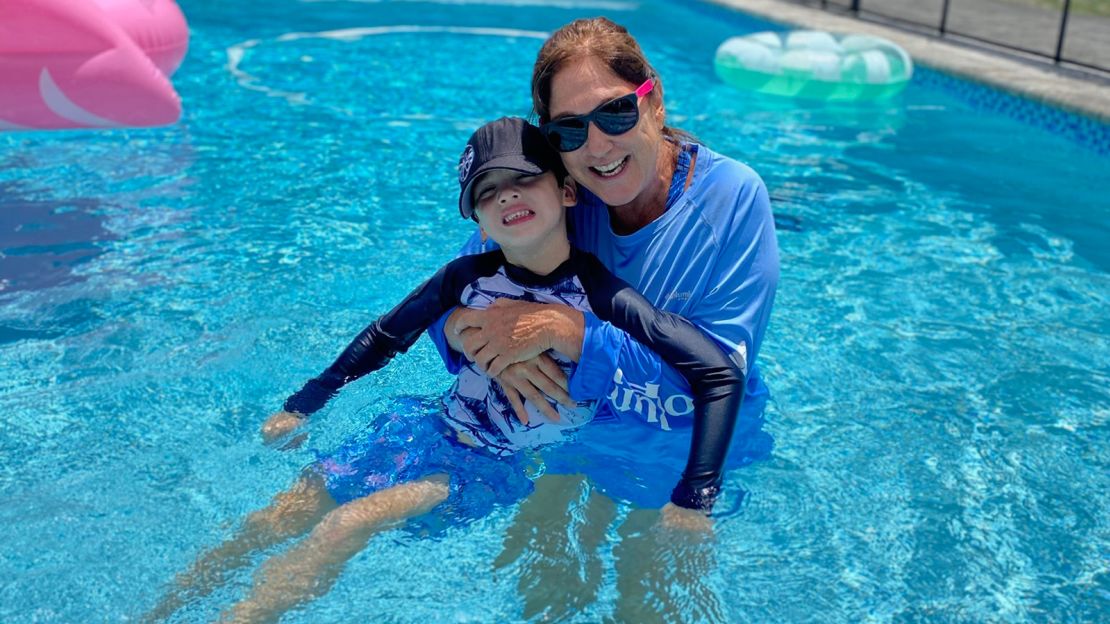PJ Rodriguez’s 7-year-old son, John, is learning to cope with the loss of his grandmother and great grandmother.
He was close to both and at times gets sad that he can’t talk to them, but a therapist has taught him to refocus his mind on happy memories when he gets down, Rodriguez said. John smiles recalling a trip to the zoo, a toy they brought him or when his parents instructed them not to bring him chicken nuggets or doughnut holes but they did anyway.
One of John’s favorite memories, he tells his parents, is when they took him to Gatorland and his grandmother – no fan of reptiles – “held a snake for me so I could a take a picture while I was holding an alligator,” Rodriguez relayed to CNN.
But John still struggles, as do hundreds of family members who lost loved ones when part of Champlain Towers South in Surfside, Florida, crumbled to the ground a year ago, killing 98 people. While state legislation promises to make condominium towers safer and settlements should soon deliver more than $1 billion to victims, relatives have yet to receive answers to important questions – namely, who’s to blame?
It’s possible they never will.
Early in the morning on June 24, 2021, residents of the 40-year-old condo tower awoke to odd noises. Many described hearing a knocking sound then a boom as the swimming pool vanished into the ground before part of the tower, housing dozens of units, came crashing down.
Photos and footage told a horrifying story: It was as if something had sheared off a wing of the 12-story building, leaving a pile of concrete, drywall and people’s belongings at its base. Reports quickly emerged that problems with the building had long been documented.
For the next month, the death toll ticked agonizingly upward, as rescuers pulled bodies from the rubble day after day. It took 12 days to find Rodriguez’s mother, 64-year-old Elena Chavez Blasser. His grandmother, Elena Chavez, 87, was found a day later.

Like his son, Rodriguez, 41, misses them painfully, especially on Saturdays when they’d come to his Miami home and spend the day, “breakfast through dinner,” playing games, swimming or visiting the park, he said.
“It was always nice just to be together,” he said.
Rodriguez likes to believe the matriarchs – lovingly dubbed the “Dos Elenas” – passed peacefully, never waking when the building came down, but his recurring nightmares tell him differently. He can tamp his imagination when he’s awake and push the thoughts out of his head, but they sneak up on him when he’s sleeping,
“The best I can describe it is a combination of (filmmakers) Michael Bay-and-Quentin Tarantino violence,” he said. “I’m inside the apartment unit seeing it, and they’re awake and running and the details are very, very vivid.”
Much has happened in a year
Scores of mourners gathered at the site early Friday for a torch lighting and moment of silence at 1:22 a.m. ET, the time the tower collapsed. Later Friday morning, Surfside held a memorial commemorating the lives of those lost. FEMA Administrator Deanne Criswell and Gov. Ron DeSantis attended the event with Surfside Mayor Shlomo Danzinger. DeSantis and First Lady Jill Biden delivered remarks.
Biden, who lost her stepson, Beau, to cancer in 2015, spoke of a “fellowship of loss” and told family members in attendance that her and her husband’s thoughts and prayers are with them.
“To the uninitiated, we look normal, average, whole, but like a secret handshake I can spot them by the sadness that rests at the corner of their smile, by the curve of their shoulders,” she said. “Though we are strangers, we know untellable truths about one another: that we will spend the rest of our lives longing for a face that is gone forever.”
The cogs of government have been whirring for the last year, trying to deliver some measure of reparation to the survivors and relatives of those killed, but there hasn’t been much in the way of accountability.
Miami-Dade Circuit Judge Michael Hanzman in May approved a $96 million settlement for people who owned units in the Champlain Towers South. (Meanwhile, a Dubai-based development company is expected to close its $120 million purchase of the 1.9-acre beachfront property by next month, said attorney Michael Goldberg, the condo association’s receiver. DAMAC Properties reportedly intends to build luxury condos there.)
Days later, DeSantis signed a condominium safety bill that will require more frequent inspections of structures like Champlain Towers. Condo associations will also have to study a building’s condition every 10 years and maintain a reserve for certain maintenance and repairs.
In pictures: Deadly condo collapse near Miami
The law could lead to substantial costs for thousands of condo owners across Florida, which initially led to an impasse among lawmakers who ended the regular session of the Legislature in March without passing any changes to state law. They sorted it out weeks later in a special session.
“It’s not a perfect solution,” said state Sen. Jason Pizzo, whose district includes Surfside. “There are some tough love measures, but the state has … a compelling interest to improve and save people’s lives that live in cooperatives and condominiums – and this will do that.”
What the law didn’t provide is any real accountability. Nor did the settlements, which did not delineate any responsibility for the collapse. The latest was finalized Thursday, when Hanzman approved a more than $1 billion settlement for heirs of the deceased and survivors, which keeps the condo association, city of Surfside, and engineering, architectural and other firms involved in the development and maintenance of Champlain Towers and neighboring properties from going to trial.
An investigation by the National Institute of Standards and Technology isn’t expected to point fingers, either. The institute, which won’t file its report until 2024, says its goal is to determine the “technical cause or causes of the building failure” and issue recommendations.
An update earlier this month said NIST was preparing to test evidence from the site and begin the next phase of interviewing those with information about the building.
‘Entire families were lost’
Rodriguez has been struggling with closure. He thought he might attain some semblance last month when he visited the Miami-Dade Police Department after being informed relatives could pick up any belongings that had survived the collapse and made it through the decontamination process.
The police were warm and sensitive, Rodriguez said, but they didn’t disclose what had been recovered. Family members found out only when they arrived. Rodriguez collected a thumb drive – containing a few documents, no photos – and a toaster oven. The item with the most sentimental value was his grandmother’s Ray-Ban aviators. The lenses were scuffed, but the sunglasses Elena Chavez wore all the time were in otherwise solid condition.

“Very surprising because I expected the lenses to be popped out and the frames to be destroyed,” Rodriguez said.
He’s apprehensive about the settlement process – and not just because the money is being delivered to victims and survivors without holding anyone to account. Even more disheartening is the prospect of proving to a court what his mother’s and grandmother’s lives were worth, he said.
Florida law establishes limits on what children and extended family members can collect – which Rodriguez, a lawyer, finds “extremely antiquated and out of touch with reality,” especially in a mass casualty event. After being nominated as executor of his mom’s estate, he has until the middle of next month to submit a claim and then he will go before a committee and a judge to deliver his case, but under state law, he said, neither his nor John’s pain and suffering will be taken into account.
“It’s definitely something I’m not looking forward to: sitting there in front of a group of people and…” he paused, conceding he has yet to collect his thoughts. “I’m not even sure what.”
To Rodriguez, it feels like companies involved in the settlement are simply throwing money at victims, hoping they’ll quietly go away, while grief-ridden loved ones are left to sort out who gets a cut of the “financial I’m sorry,” he said.
“People lost their children, siblings, wives, husbands,” he said. “Entire families were lost, and everyone just threw their hands up and said, ‘I’m not responsible. Here is my insurance company.’”

As for what will deliver closure, Rodriguez is unsure. He visited a therapist shortly after the disaster, but he wasn’t in the right mindset, he said. He’ll try again later.
The fact the local prosecutor hasn’t officially closed the door on pressing charges is encouraging, he said, though a grand jury she empaneled last year delivered recommendations to change state law rather than hand down criminal counts.
“The closest thing would be having some kind of accountability, but even then I’m not sure that would bring me the closure, but it might bring me a little bit closer,” he said. “They continue to say, ‘Time heals everything,’ and over time I’m sure that is correct, but approaching a year now … I’m not anywhere near being OK.”
CNN’s Leyla Santiago, Jaide Timm-Garcia, Carlos Suarez, Steve Contorno, Jamiel Lynch, Tina Burnside, Denise Royal and Elizabeth Wolfe contributed to this report.































































